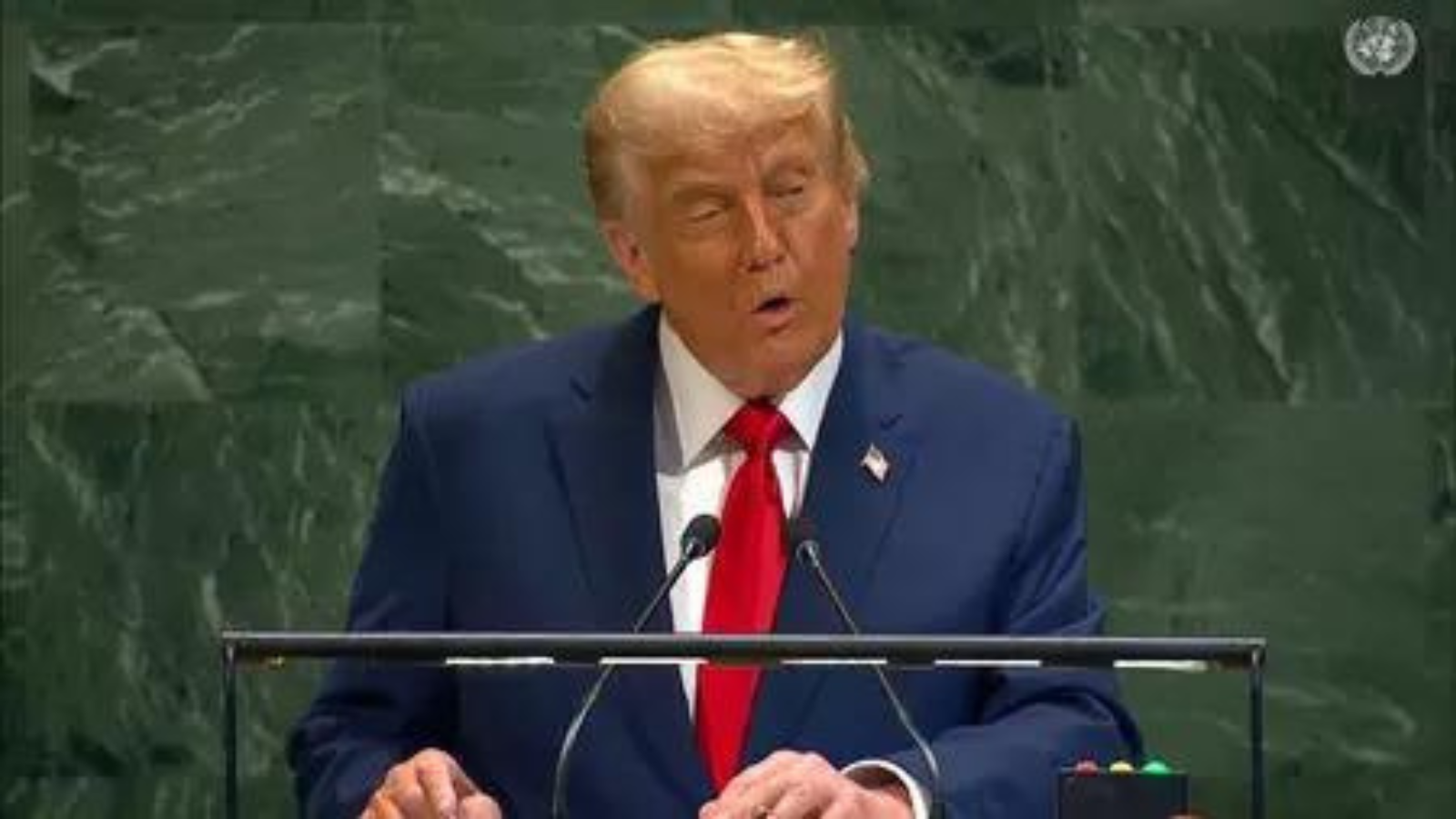Trump Claims He 'Stopped Nuclear War' Between India and Pakistan, Revises Jet Count to Eight
In yet another bizarre display of exaggeration and self-congratulation, U.S. President Donald Trump has once again revisited the India–Pakistan conflict — a topic he often uses to underscore his supposed role as a global dealmaker and peace broker. Speaking at the America Business Forum in Miami, Trump claimed that eight fighter jets were shot down during the three-day hostilities in May, adding that his timely intervention through “trade threats” helped avert a potential nuclear war between the two South Asian neighbours.
While the event was ostensibly a platform for business leaders and investors, the President used it to boast about his diplomatic prowess, repeating — for the 60th time in recent months — his claim of having personally de-escalated tensions between India and Pakistan.
In reality, the Operation Sindoor skirmish between India and Pakistan from May 7 to 10 resulted in limited losses on both sides, with India confirming damage to its aircraft but also claiming the destruction of 8–10 Pakistani fighter jets, including U.S.-made F-16s and Chinese JF-17s, both in the air and on the ground.
The Indian government has repeatedly clarified that any ceasefire understanding with Pakistan was achieved through direct diplomatic channels and not via U.S. mediation. Indian officials have dismissed Trump’s assertions as “factually incorrect and diplomatically misleading.”
In contrast, Pakistan’s leadership has often echoed or amplified Trump’s statements, possibly viewing his involvement as a way to internationalise the Kashmir issue and project itself as open to third-party mediation — a stance India categorically rejects.
This contrast in responses has created an awkward diplomatic undercurrent, with Trump’s frequent mischaracterisations threatening to complicate U.S. relations with both nations.
Observers note that his comments, though light-hearted in tone, often blur fact and fiction, creating confusion about the United States’ actual diplomatic engagement.
Political analysts suggest that Trump’s retelling of the India–Pakistan story serves multiple purposes — reinforcing his image as a decisive leader to his domestic base while diverting attention from ongoing policy controversies.
India’s Ministry of Defence stated that its air force successfully neutralised multiple Pakistani fighter jets, while Pakistan denied those claims and insisted that India suffered greater losses. International observers noted that both sides engaged in aggressive posturing but ultimately pulled back after diplomatic talks, not U.S. intervention.
No credible evidence or official record supports Trump’s repeated claims that his administration brokered a ceasefire.

While the event was ostensibly a platform for business leaders and investors, the President used it to boast about his diplomatic prowess, repeating — for the 60th time in recent months — his claim of having personally de-escalated tensions between India and Pakistan.
Trump’s Changing Narrative: From Five to Seven, Now Eight Jets
Trump’s version of events has evolved dramatically over the past few months, with the number of downed jets changing almost every time he tells the story. Initially, he claimed five aircraft were shot down, later revising that to seven during an October event in Tokyo. Now, at the Miami forum, he has pushed the number up to eight.“You know, I was in the midst of a trade deal with both of them (India and Pakistan), and then I read on the front page of a certain newspaper... I heard they were going to war. Seven planes were shot down, and the eighth was really badly wounded… Eight planes were shot down, essentially,” Trump said to an amused crowd.The President, however, once again refrained from specifying which country’s aircraft were destroyed, blurring the details of the supposed exchange.
In reality, the Operation Sindoor skirmish between India and Pakistan from May 7 to 10 resulted in limited losses on both sides, with India confirming damage to its aircraft but also claiming the destruction of 8–10 Pakistani fighter jets, including U.S.-made F-16s and Chinese JF-17s, both in the air and on the ground.
Trump’s “Trade Threat” Diplomacy
At the forum, Trump once again positioned himself as the central figure who “stopped a nuclear war” through the power of economic leverage.“I said, this is war, and they are going at it. And they are two nuclear nations. I said, ‘I’m not going to make any trade deals with you guys unless you agree to peace,’” Trump told the Miami audience, to loud applause.He went on to claim that within 24 hours, both nations contacted him to announce a ceasefire deal.
“I said, ‘Thank you. Let’s do trade.’ Isn’t that great? Tariffs did that. Without tariffs, that would have never happened.”This statement aligns with Trump’s recurring narrative of using trade negotiations as instruments of diplomacy — a hallmark of his “America First” doctrine.
India Denies Trump’s Claims, Pakistan Plays Along
While Trump continues to portray himself as the saviour who brokered peace between two nuclear powers, his claims have been met with firm denials from New Delhi.The Indian government has repeatedly clarified that any ceasefire understanding with Pakistan was achieved through direct diplomatic channels and not via U.S. mediation. Indian officials have dismissed Trump’s assertions as “factually incorrect and diplomatically misleading.”
In contrast, Pakistan’s leadership has often echoed or amplified Trump’s statements, possibly viewing his involvement as a way to internationalise the Kashmir issue and project itself as open to third-party mediation — a stance India categorically rejects.
This contrast in responses has created an awkward diplomatic undercurrent, with Trump’s frequent mischaracterisations threatening to complicate U.S. relations with both nations.
A Pattern of Exaggerated “Peacekeeping”
Trump’s latest remarks continue a familiar pattern of inflated claims about his global peacemaking role. From North Korea and the Middle East to Ukraine and now South Asia, he has often inserted himself into conflicts as a self-proclaimed negotiator who “prevented wars.”Observers note that his comments, though light-hearted in tone, often blur fact and fiction, creating confusion about the United States’ actual diplomatic engagement.
You may also like
 Super Cup: SC Delhi score first-ever point as Rajasthan United bow out
Super Cup: SC Delhi score first-ever point as Rajasthan United bow out- Apollo doctor warns: 10 big misconceptions about common diseases that could cost lives
 Delhi: Mizoram officers pick up smart city tips at NDMC
Delhi: Mizoram officers pick up smart city tips at NDMC 64.46 per cent voter turnout in first phase assembly polls: Bihar CEO
64.46 per cent voter turnout in first phase assembly polls: Bihar CEO Bihar polls: 64.6% provisional turnout recorded in first phase, says EC
Bihar polls: 64.6% provisional turnout recorded in first phase, says EC
Political analysts suggest that Trump’s retelling of the India–Pakistan story serves multiple purposes — reinforcing his image as a decisive leader to his domestic base while diverting attention from ongoing policy controversies.
“For Trump, every platform is a campaign stage,” said foreign policy expert Dr. Alan Weaver. “He’s not concerned with accuracy — he’s concerned with perception. The India–Pakistan narrative gives him a dramatic story to tell: nuclear tension, trade deals, and his role as the man who made it all go away.”
Fact-Check: What Really Happened in May
The May 2025 border skirmishes, later dubbed Operation Sindoor, represented one of the sharpest escalations between India and Pakistan in recent years. The confrontation involved limited air and artillery engagements along the Line of Control (LoC), with both sides reporting damage but no major territorial changes.India’s Ministry of Defence stated that its air force successfully neutralised multiple Pakistani fighter jets, while Pakistan denied those claims and insisted that India suffered greater losses. International observers noted that both sides engaged in aggressive posturing but ultimately pulled back after diplomatic talks, not U.S. intervention.
No credible evidence or official record supports Trump’s repeated claims that his administration brokered a ceasefire.
The “Tariffs Stopped a War” Narrative
Trump’s Miami comments highlighted his belief that economic tools like tariffs can be wielded as instruments of peace.“Without tariffs, that would have never happened,” he reiterated, suggesting that trade restrictions forced both nations to negotiate.While this narrative resonates with Trump’s core supporters, economists and foreign policy analysts have dismissed it as simplistic and misleading. They argue that trade threats played no documented role in de-escalating the India–Pakistan conflict and that U.S. diplomatic engagement during that period was minimal.









